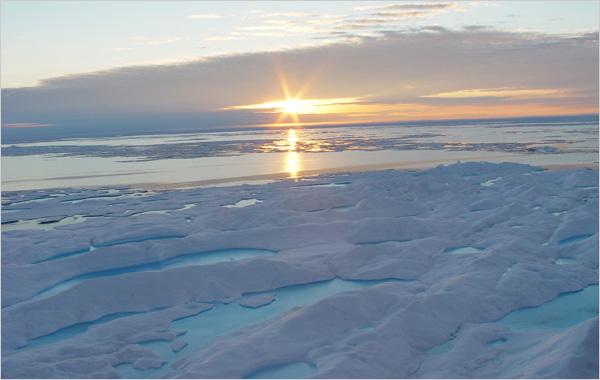There is a large globe on the first floor of Hege Library. Look at the axis in the arctic region and you will see that large areas of white cluster around the continents. This depiction becomes less accurate each year, as the area of the ice decreases as a result of climate change, reaching the lowest amount of sea ice for July this year, according to National Public Radio.
“The Arctic keeps surprising us,” said Director of the National Snow and Ice Data Center at the University of Colorado Mark Serreze, according to NPR, “The point is we’re losing the sea ice faster than we think we ought to be. And this is causing us to revise some of our estimates.
Estimates vary when considering how long it will take for the arctic ice to melt entirely away. Some estimate the date could be as soon as 2030 after seeing recent melting trends.
“The rate of sea-ice loss we’re observing is much worse than even the most pessimistic projections led us to believe,” said Deputy Campaigns Director with Greenpeace USA Carroll Muffett, according to Worldwatch Institute.
However, the current situation is worse than it probably appears because older, stronger ice is melting and being replaced with recently frozen ice during the cold winter months.
“I would say what we’re experiencing now is softer ice,” said Eddy Carmack, leading oceanographer with Fisheries and Oceans Canada, according to NPR. “It’s not as formidable, it’s yielding to the pressure of the ship, it’s breaking easily. And that’s because the ice itself is warmer.”
As the ice melts, the arctic becomes more attractive as an area for natural resources and a more convenient shipping passage. The U.S., Russia, and Canada are all among the nations vying for control of the region.
“Our position is that these waters are Canadian, subject to full Canadian regulation and control,” said Canada’s Minister of Health Leona Aglukka, according to NPR.
Other countries disagree, claiming the Northwest Passage is an international waterway and its location in Canada’s arctic region is purely coincidental. Canada, the U.S., Russia, and others will present their cases to the United Nations by 2013.
Nations are not the only groups clamoring for control in the arctic. According to Worldwatch, “these open waters are potential treasure chests” for oil and gas companies.
However, according to NPR, Geologist David Boerner said that a stampede to the arctic by the aforementioned companies is unlikely even after the region is completely cleared of ice. The arctic would only be ice-free for a short period of the year, and economical and geographical challenges will still exist.
Everyone has not given up on the arctic. Russian Prime Minister Vladimir Putin seems determined to traverse the region in the name of improving Russia’s economy and asserting their world power, according to NPR. Though many people are excited and hopeful as a result of the assertion, others are skeptical.
“The Arctic is just so fragile,” said Nadezhda Lyashenko, member of the indigenous Saami tribe, according to NPR. “This time, it’s a research boat going out there. It’s like the prick of a needle, and the land will heal. But if they go with knives, with spears, they could break everything. And then what?”
“It’s unfortunate that such dramatic changes in the environment aren’t shocking people into waking up and changing how we live,” said Visiting Assistant Professor of Philosophy Joe Cole in an email. “But the people doing the drilling and the consuming are too focused on our short term benefits–profits, jobs, comfort, and convenience. We as humans have a long history of severe exploitation of the environment, and sadly we don’t often change until we are hit with catastrophe, or the resource is gone.”
Though many countries have ambitions and plans for the region, the U.S. is clearly lagging behind. Though the U.S. owns the most capable ice breaking vessels – excluding Russia’s nuclear-powered icebreakers – they are currently out of commission, and only one will survive, according to NPR.
In addition, the U.S. has not ratified the United Nations Convention on the Law of the Sea – the global treaty that defines how countries claim natural resources on the ocean floor – due to conservative Republican objections to the UN.
“As a conservative, I believe the United States and the American people have a right to all of [its continental shelf],” said International Law Analyst at the Conservative Heritage Foundation Steven Groves, “They don’t have to lay claim to it by being a party to a treaty. They own it already.”
Through all the discussions and conflict, the ice in the arctic is still melting and the climate is still changing. Frida Bengtsson, blogger for Greanpeace International, was recently part of an expedition into the arctic where they saw the melting ice first-hand.
“We want to bear witness as this remote place is changing because of how we live our lives in that normal world we left two weeks ago,” said Bengstonn.

